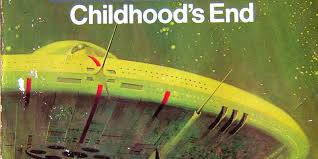Childhood’s end

Evil men could be destroyed, but nothing could be done with good men who were deluded.
Book presentation
Childhood’s end is an innovative science-fiction book by Sci-Fi legend Arthur C. Clarke and published in 1953 and is an expansion of his short story “Guardian Angel” published in 1946.
The story occurs over a span of 100 crucial years starting in the near future of Earth, with four clear sections occurring at the beginning of that 100 years, 5 years into that century, at the mid-point of the period and closing to the last few years of the period.
The book kick starts with the arrival of massive saucer-like spaceships which positions themselves in silence over the major cities on earth. If you want to have an idea of how this looks, I strongly suggest you watch the opening of the movie Independence Day, as the positioning of the spaceship cannot be anything but an homage to his book.
However, instead of attacking the planet, the spaceship above New York City (where the UN reside), announces one week later that these aliens will assume supervision of international affairs to prevent the extinction of humanity (the book was written during the nuclear arms race). A supervisor, Karellen was assigned and the humans quickly nickname the aliens “Overlords”.
Slowly, the overlords who never reveal themselves, begin reshaping humanity to turn the Earth into an utopia and as a result, human culture halts as creativity and scientific research dies down in the face of such advanced technology that our small progress seems trivial.
A few individuals are, justly I might had, worried that these changes will cause the end of human civilization and several of them take action to learn more, from kidnapping the secretary general of the UN (the only being able to talk to Karellan) to using a Ouija board and even hiding on a transport ship bound to the Overlord homeworld and it is mainly through these attempts that the story progresses to it’s climax and final reveal.
The book is Arthur C. Clarke first successful novel and is widely regarded as his best novel and a classic of alien literature. In fact, Stanley Kubrick had intended to collaborate with Clark in the 1960s on turning it into a movie but from that collaboration came 2001: A Space Odyssey. A six hours television series will be broadcasted by the SyFy Channel in 2015.
Critical Review
I’ll go directly at it: I really didn’t like Childhood’s End. Ok, maybe I am being too harsh: most of the sections of the audio-book were interesting to listen to and the two readers were phenomenal doing various voices. It is clear to me that this audio-book got first grade production.
My problem isn’t even with the story itself. I am sure that had I read the book on the day it came out, I would have love it even if some of the aspects, even then, would have bothered me.
The reason I was bored was that each and every aspect of this book was over-exploited later by other works who possibly inspired themselves from this book, but in ways that are so clearly better made that Childhood’s End appeared dated and old, something I usually rarely when reading golden era science-fiction such as the Fondation series written 10 years earlier or other later Arthur C. Clarke books.
But these other books are not as singular in scope as Childhood’s End is. Childhood’s End is a single linear story with shocking twists for the era which today are so plainly seen ahead that the book seems to lack them.
This can be typical of high-concept stories. In such genre, the author picks a concept, like the arrival of extra-terrestrials in this one, the large vampirisaton of Society in the movie Daybreakers, pre-cog crime fighting in Minority Report and then, explores everything he can about that concept for the duration of the story.
In Daybreakers, Minority Report and in Childhood’s end, you can easily expect the concept to fall apart by the end of the story in one way or another.
And so, at some point, I knew so much how the book would finish that I thought the climax was already reached even thought I still had 90 minutes left on the counter. I couldn’t see any twist endings and between you and I, the few surprises of last epilogue barely rose an eyebrow and if it triggered an emotion, it was more exasperation over the cliché ending.
But then again, I am sure it’s not the book’s fault however as it presented a novel idea which probably came as a shock in the pre-hippies red scare 1950s but which today were better explored by medias such as TV show Stargate SG-1.
A few of the themes of SG-1 take the subplots of Childhood’s End and explore them further. Stargate Atlantis even has an episode of that name!
For people who both read Childhood’s End and who watched SG-1, I will just say that if you didn’t make the link, the Overlords made me strongly think of the Aschen confederation while the ending make me think of the Ancients.
So, should you listen to Childhood’s end?
If you are starting on Sci-fi, definitely. It is a ground-breaking story and one of the best novels of the golden age of science-fiction and unlike many other such stories, I feel like it is somewhat accessible with the emphasis made on new ideas (for the time) with a mixture of new things (like the start of the new age movement) with little need to have prior understanding of science-fiction concepts.
If you already read a lot of more recent Sci-fi (but not this story), you might be at a loss since like I said earlier, I am not sure it aged well for sci-fi connoisseurs and it lacks the depth of other contemporary stories. For example, 2001 is already a much better book, in my humble opinion and unlike the movie, it actually makes sense.
But even for fans of the genre, Childhood’s end isn’t without its merits. It is a pivotal piece of science-fiction and I feel that the only reason it didn’t age so well is precisely because so many following authors inspired themselves from it.
In all cases, I will be waiting for the miniseries with anticipation since this will make for very fascinating visuals…
